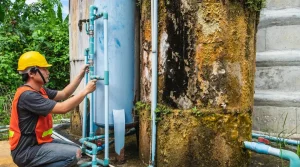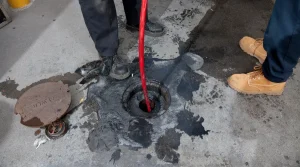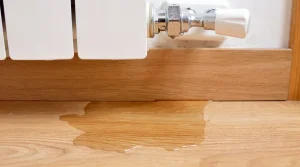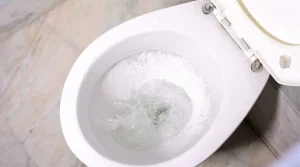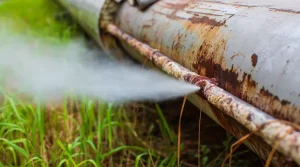A clogged sewer line can disrupt your entire plumbing system, leading to messy backups, unpleasant odors, and expensive repairs. Whether the cause is tree roots, poor disposal habits, or aging infrastructure, knowing how to spot and deal with the issue early can save you serious time and money.
This guide covers everything you need to know about clogged sewer lines, from common causes and symptoms to prevention tips and when to call a professional.
What Causes a Clogged Sewer Line?
Tree Root Invasion
One of the most common causes of a clogged sewer line is tree root infiltration. Roots naturally grow toward moisture, and small cracks in your sewer line offer an easy entry point. Once inside, roots can expand and block the line entirely. Even if there are no large trees directly on your property, root systems from nearby yards can still reach your pipes.
Flushing the Wrong Items
Everyday habits can also contribute to sewer line clogs. Flushing paper towels, hygiene products, baby wipes, and even small food scraps can create buildup over time. Grease is another major culprit—it may go down as a liquid, but it hardens inside pipes and traps other debris. These blockages often start small but can lead to a clogged sewer line affecting multiple drains.
Broken or Collapsed Pipes
Older homes may still rely on sewer lines made of clay or cast iron, which weaken and collapse with age. As the ground shifts or materials corrode, sections of the pipe can break, causing a complete blockage. These issues are best identified through professional camera inspections.
Signs You Have a Clogged Sewer Line
Recognizing the symptoms early can help prevent property damage and major health concerns.
- Multiple Drains Backing Up: If more than one drain is slow or clogged, the issue likely originates from the main sewer line.
- Foul Odors: Smells of sewage coming from drains or your yard often signal a clog.
- Gurgling Sounds: Strange noises from toilets or sinks suggest trapped air caused by a blockage.
- Lush Grass Patches: If your yard suddenly has bright green patches, a clogged sewer line may be leaking and fertilizing the soil.
If you notice any of these signs, it’s important to act quickly. Delaying repairs can lead to indoor sewage backups and costly restoration work.
Why Prompt Action Matters
Addressing a clogged sewer line immediately has several important benefits:
Preventing Property Damage
Backups can flood basements and bathrooms, damaging flooring, walls, and personal items. Swift maintenance helps you avoid these scenarios.
Avoiding Costly Repairs
Catching a sewer line problem early can mean the difference between a simple cleaning and a full pipe replacement. Camera inspections and professional cleanings are far more affordable than emergency excavation.
Protecting Your Health
Raw sewage contains bacteria, viruses, and dangerous gases. If a clogged sewer line leads to backups inside your home, it can create a hazardous living environment. Regular inspections and timely repairs keep your household safe and sanitary.
How to Prevent a Clogged Sewer Line
While not all blockages can be avoided, several steps can significantly reduce your risk.
Be cautious with what you flush. Only toilet paper and human waste should go down the toilet. Cooking grease should be poured into a container and thrown in the trash rather than down the sink.
Annual sewer line inspections, especially for older homes or those with large trees nearby, can catch issues before they escalate. Professionals can also perform preventative cleanings to remove early buildup or minor root intrusion.
FAQs About Clogged Sewer Lines
Q1: What should I avoid flushing?
Avoid flushing paper towels, baby wipes, feminine hygiene products, and grease. These are frequent contributors to a clogged sewer line.
Q2: How often should I inspect my sewer line?
Yearly inspections are ideal, especially for older homes or those with known root issues. Camera inspections help detect damage without digging.
Q3: Can I fix a sewer clog myself?
Minor drain issues may be resolved with a plunger, but main sewer line clogs often require hydro jetting or auger tools only professionals have.
Q4: How do professionals find the clog?
Plumbers use specialized cameras to inspect the inside of pipes, pinpointing blockages like tree roots or collapsed sections.
Q5: Why act quickly?
Delaying sewer repairs can lead to property damage, health risks, and rising costs. Acting promptly protects both your home and your wallet.
Final Thoughts
A clogged sewer line isn’t just an inconvenience—it’s a plumbing emergency that can escalate quickly if left unresolved. From early warning signs to long-term prevention strategies, staying proactive is key. Regular maintenance and responsible use of your drains can help you avoid the worst.
If you’re experiencing signs of a clogged sewer line in North Bergen, BJC Plumbers North Bergen offers fast, reliable solutions. Contact our expert team today to schedule an inspection or emergency service and get your plumbing back on track.


